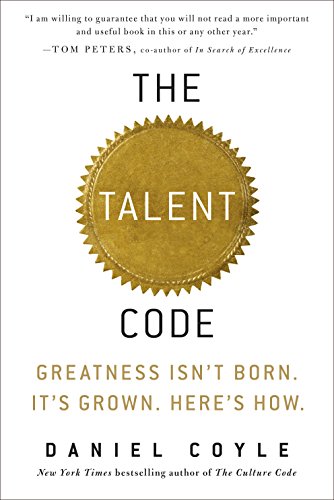Overview of “The Talent Code: Greatness Isn’t Born. It’s Grown. Here’s How” by Daniel Coyle Link to heading
Summary Link to heading
“The Talent Code” by Daniel Coyle explores the concept that greatness and exceptional talent are not innate but rather the result of deep practice, passion, and proper coaching. Coyle examines various “talent hotbeds” worldwide and identifies three primary elements that contribute to the development of exceptional skills: deep practice, ignition, and master coaching. The book discusses the scientific principles behind skill development, particularly focusing on the role of myelin, a neural insulator that grows in response to practice and strengthens neural pathways. Through engaging anecdotes and empirical research, Coyle reveals how anyone can enhance their abilities through deliberate practice and motivation.
Review Link to heading
Daniel Coyle’s “The Talent Code” has been well-received for its accessible writing style and engaging storytelling. The book effectively combines scientific insights with practical applications, making complex neurological concepts understandable to a broad audience. One of its strengths is the use of real-world examples to demonstrate how the principles of talent development work in various fields, from sports to music. However, some critiques point out that the book may oversimplify the intricate nature of talent development and the role of innate abilities. Nonetheless, it provides a compelling and motivational argument that challenges traditional views on talent and intelligence.
Key Takeaways Link to heading
Deep Practice: This is a targeted approach to practicing skills, focusing on making and fixing errors. The concept suggests that more strategic practice leads to more significant skill improvement.
Ignition: Passion and motivation are vital for skill development. Identifying personal sparks or inspiration helps sustain long-term commitment to practice.
Master Coaching: Skilled mentors and coaches play a crucial role in guiding individuals, providing valuable feedback, and creating an environment conducive to learning.
Role of Myelin: Myelin is essential in reinforcing neural pathways and enhancing the speed and accuracy of skills. Repeated practice builds more myelin, contributing to better performance.
Growth Mindset: The belief that abilities can be developed through hard work is fundamental for achieving greatness.
Recommendation Link to heading
“The Talent Code” is recommended for readers interested in understanding the science of skill acquisition or those seeking motivation for personal development. It is particularly useful for educators, coaches, and parents who wish to cultivate talent in others. The book’s insights into practice and motivation are applicable to various domains, making it a valuable resource for anyone eager to improve their skills and reach their full potential.
